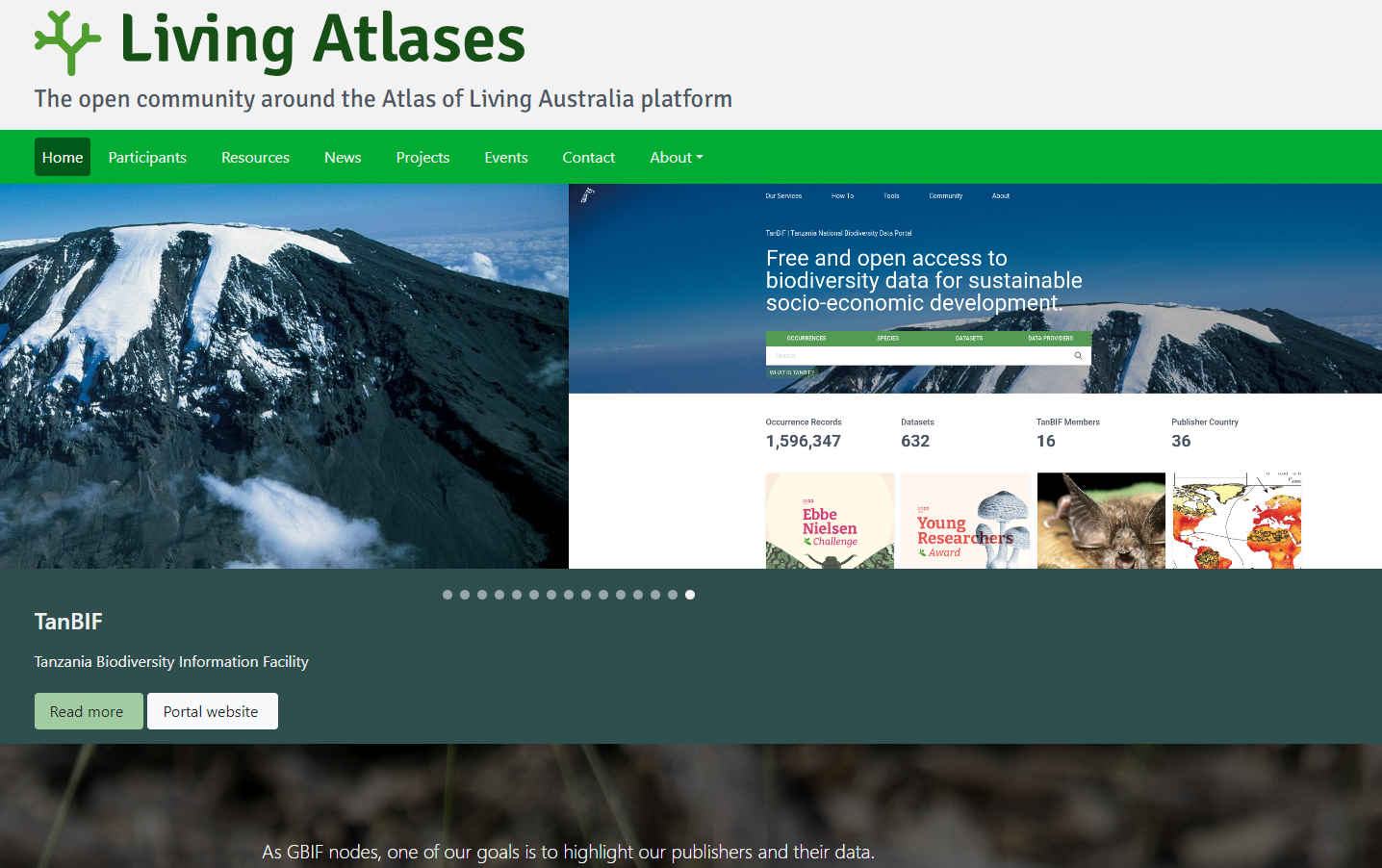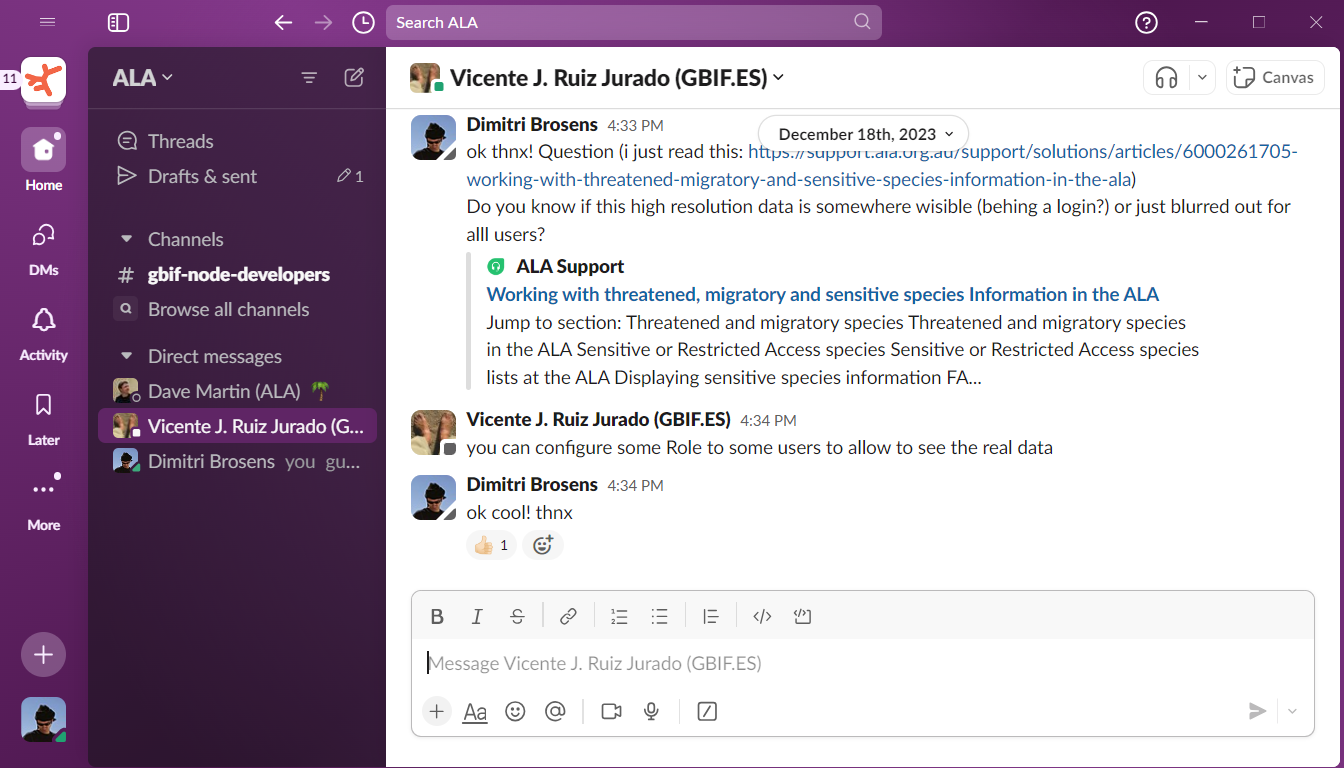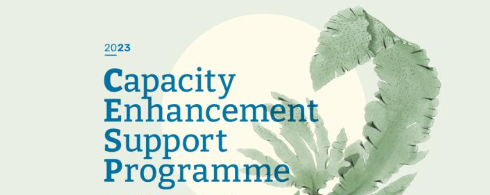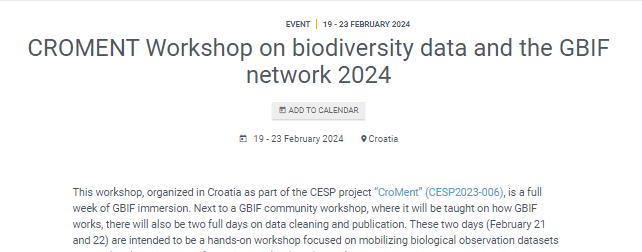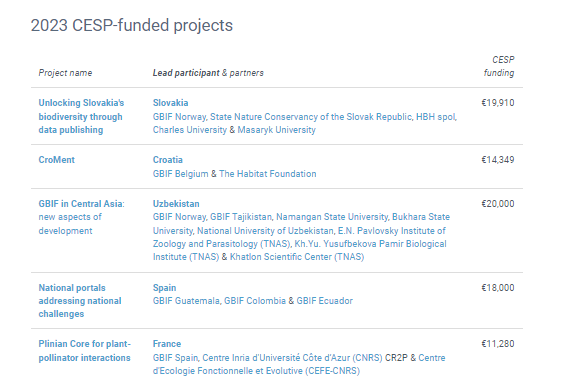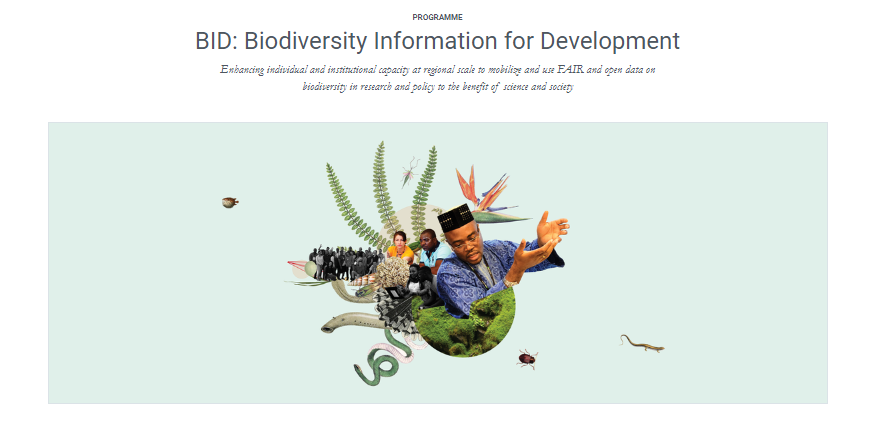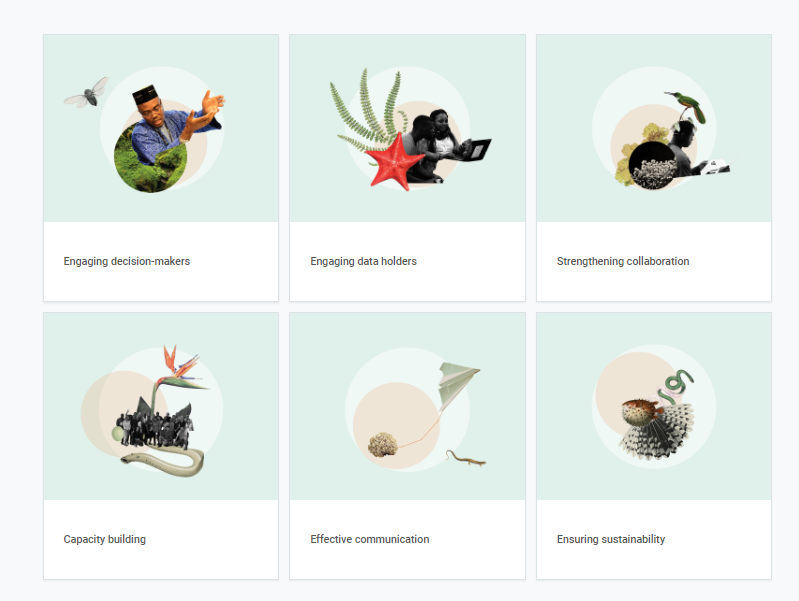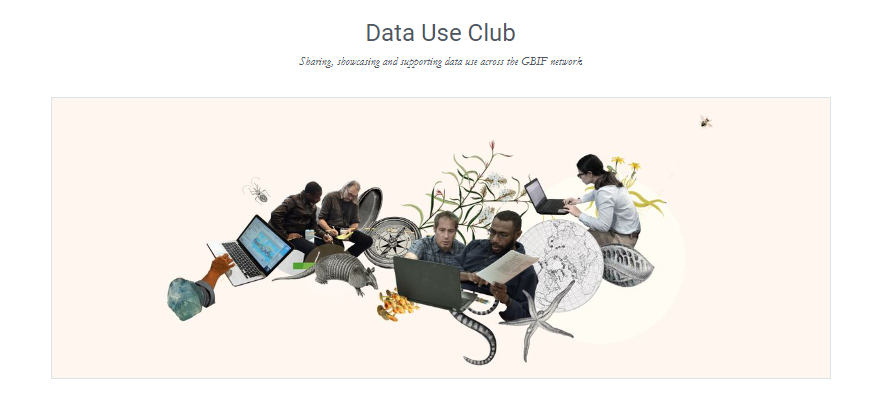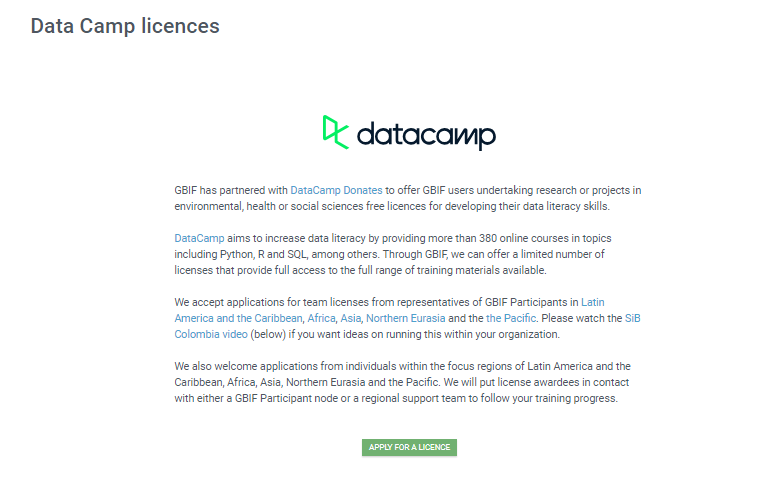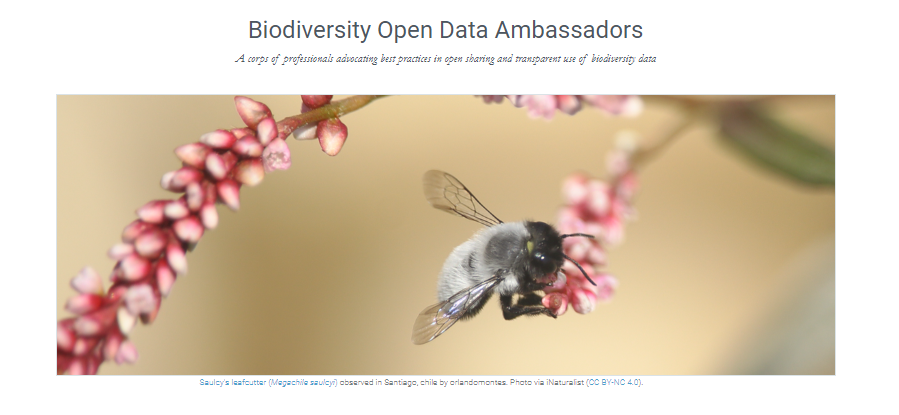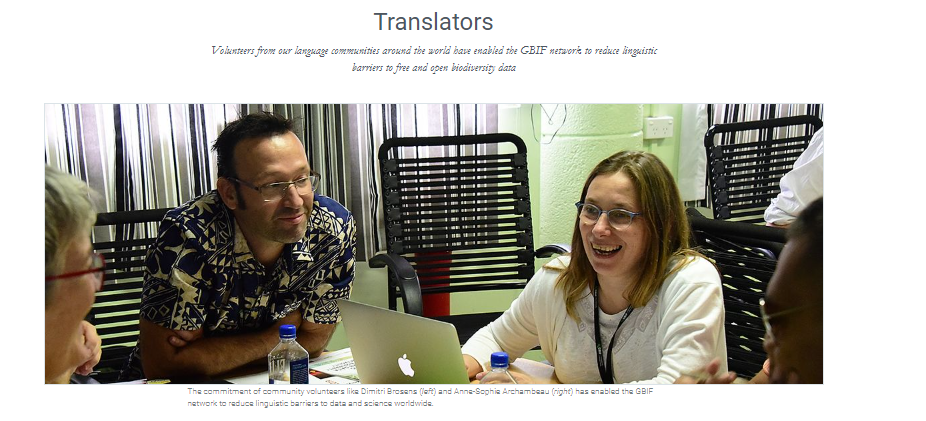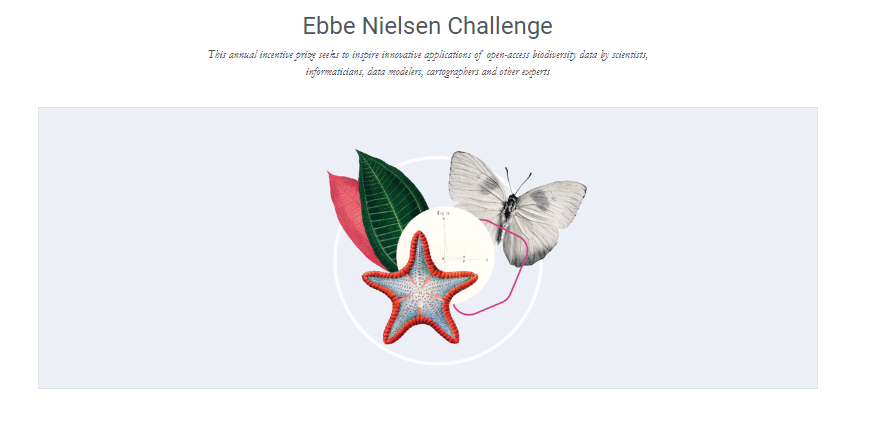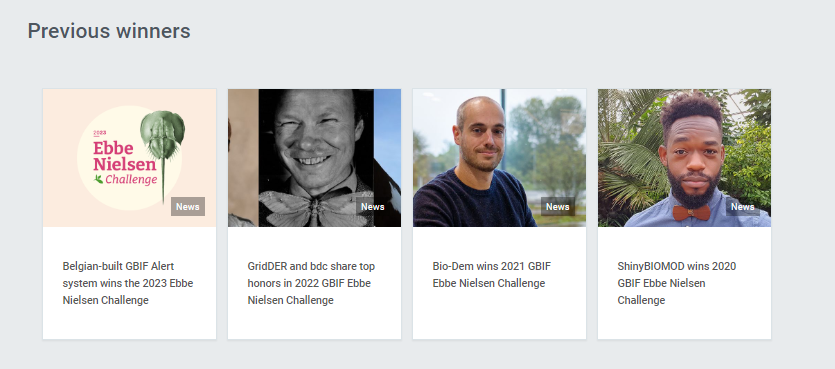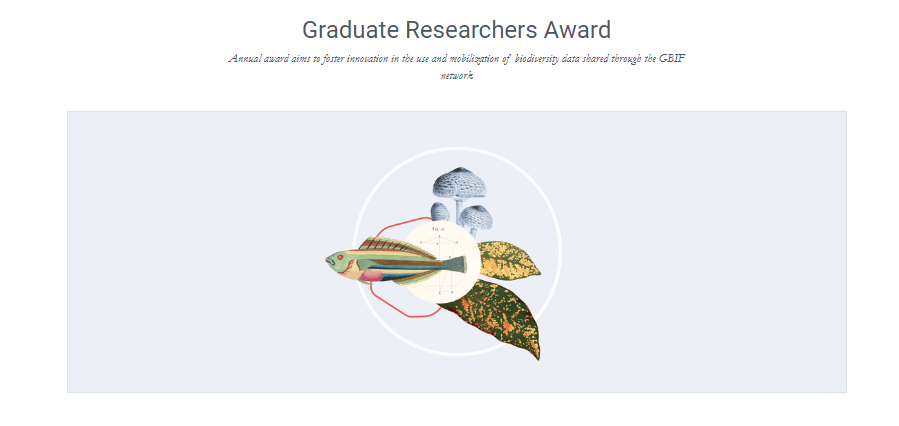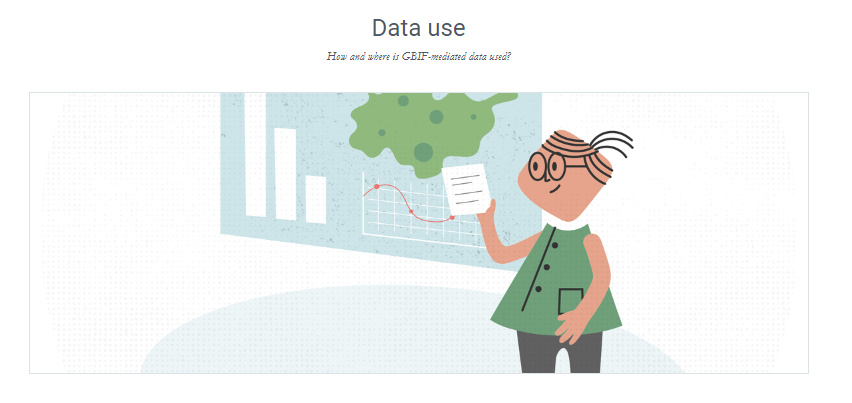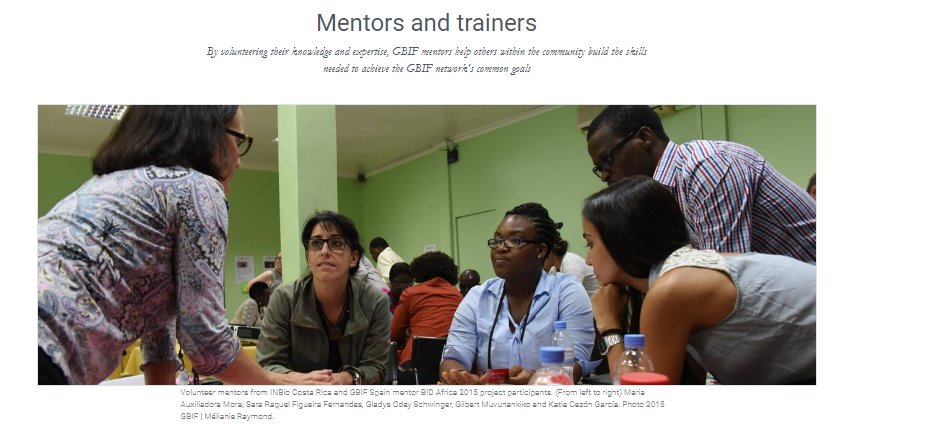GBIF opportunities (CESP, BID, Ambassador programme, data use club...)
Overview
Teaching: 60 min
Exercises: 0 minQuestions
What is CESP
What is BID
…
Objectives
Learn about CESP
Learn about BID
Learn about the GBIF Ambassador programme
Living atlasses community
As GBIF nodes, one of our goals is to highlight our publishers and their data. To achieve this, the Atlas of Living Australia (ALA) developed a huge open source platform with several modules re-usable by other organizations. Since 2013, the community around this tool has organized technical workshops to present ALA modules to other institutions that wanted to implement it, to improve already existing national data portals and to learn from each other’s achievements.
CESP: Capacity Enhancement Support Programme
This programme aims to address specific capacity needs identified by GBIF Participants by facilitating collaboration at regional and global levels.
The annual calls for proposals under this programme provide co-funding to GBIF Participants for capacity enhancement projects based on combinations of the following types of action:
Mentoring activities: Interactions among two or more Participants where the core objective is the transfer of information, technology, experience and best practices in small groups.
Support for regional events and training workshops: Courses and workshops with a regional (multi-national) component to enhance the capacity of individuals or networks to contribute to and benefit from GBIF.
Documentation: Production of key learning and promotional resources or their adaptation to the national or regional context (e.g. by translation or including local/regional perspectives). The GBIF Secretariat advocates digital-first documentation to provide technical guidance and support training and skills development across GBIF’s communities of practice. The key features of this system include standardized documentation, routine updates, versioning, translations, community input, peer review, and searchable format.
These types of action are part of the suite of capacity enhancement activities provided by GBIF, to enable effective mobilization and use of biodiversity information.
BID: Biodiversity Information for Development
Biodiversity Information for Development (BID) is a multi-year programme funded by the European Union and led by GBIF with the aim of enhancing capacity for effective mobilization and use of biodiversity data in research and policy in the ‘ACP’ nations of sub-Saharan Africa, the Caribbean and the Pacific.
Funding from the programme’s first phase has supported capacity enhancement activities and projects to mobilize biodiversity data and strengthened national and regional biodiversity information facilities in these regions. Its impacts to date have focused on data that support the regions’ policy needs, particularly in connection with protected areas, threatened species and invasive alien species.
Data use club
The Data Use Club is a space that promotes the interaction between data users and provides them with tools for developing skills in data use, no matter where they are in the world. In the club, we provide support in the following form:
Training seminars: This quarterly webinar series highlights approaches to global problems using GBIF-mediated data. Each seminar provides opportunities for knowledge exchange and inspiration for GBIF users who wih to develop their own solutions to similar challenges.
Practical sessions: This quarterly webinar series focuses on developing the informatic and data management skills necessary to fully exploit the potential of GBIF-mediated data. The material for these sessions expands on the biodiversity data use curriculum developed by GBIF.
DataCamp online training: GBIF users can receive free access to the full suite of online training offered by DataCamp through DataCamp Donates.
For questions regarding the Data Use Club, please contact datause@gbif.org
Ambassador programme
The success of GBIF depends in part on establishing a good understanding within research and policy communities of the benefits and opportunities provided by free and open access to biodiversity data, as well as the importance of responsible use of such data through proper citation and attribution.
The GBIF Secretariat and GBIF participant nodes work to promote this understanding through their communication platforms, at meetings and across networks around of the world. However, this relatively small group can never hope to reach all relevant communities without assistance.
Biodiversity Open Data Ambassadors can fill that gap. If you are a biodiversity professional who promotes the principles and best practices of open data sharing and use, we can equip you with information resources, networking opportunities and recognition to make you an even more effective advocate in your own professional communities.
How to become a GBIF data ambassador
Are you a potential Biodiversity Open Data Ambassador? We ask for some minimum qualifications and a basic level of commitment, namely that:
- You can provide at least one example in which you have shared biodiversity data through GBIF, used GBIF-mediated data, and/or advocated open data in your professional capacity
- You agree with the ICSU-World Data System Data Sharing Principles: in short, that data should be shared openly in a timely manner, with the fewest restrictions possible and used with proper citation.
- You consent to have your contact details openly available on GBIF.org, and possibly on websites run by GBIF nodes and partners
- You consent to be contacted by GBIF Secretariat and GBIF nodes with requests to promote open biodiversity data at particular events
-
You undertake to provide details of at least one example each year of an event, publication or process in which you have advocated for open biodiversity data
If you fit the description above, it’s simple—just fill out this form.
GBIF translators
Can I join the GBIF translator community?
The work of translation is never done: we are always creating new content, and we introduce small but incremental additions and adjustments to the user interface on an almost weekly basis. We often have other publications and documentation in need of translations (or updated translations), so we welcome the involvement of newcomers who can help us maintain progress in making free and open data even more widely accessible around the world.
If you are interested in joining our volunteer community, please feel free to email us at communication@gbif.org. We’ll discuss current priorities and arrange a time to orient you to the key tools and the most pressing tasks.
If you already have experience with CrowdIn (which our community first started using in 2014 to translate the interface for the GBIF IPT), you can simply request to join the CrowdIn project for your preferred language.
Ebbe Nielsen Challenge
The GBIF Ebbe Nielsen Challenge is an annual incentive prize that seeks to inspire innovative applications of open-access biodiversity data by scientists, informaticians, data modelers, cartographers and other experts.
The call for entries for the 2024 Ebbe Nielsen Challenge is now open! DEADLINE: 24 August 2024
Like the Ebbe Nielsen Prize it replaced, the Challenge honours the memory of Dr Ebbe Schmidt Nielsen, an inspirational leader in the fields of biosystematics and biodiversity informatics and one of the principal founders of GBIF, who died unexpectedly just before it came into being.
While the focus of the competition has evolved from year to year, Challenge entries manifest a variety of forms and approaches—new analytical research, richer policy-relevant visualizations, web and mobile applications, or improvements to processes around data digitization, quality and access. Allocations from the annual prize pool of €20,000 will award the first-place team with €8,000, €6,000 for second place, and €3,000 each for the third-place winners.
The Graduate Researchers Award
The Graduate Researchers Award (previously the Young Researchers Award) is an annual programme aimed at fostering innovative research and discovery in biodiversity informatics. The GRA provides prizes to two graduate students—generally one Master’s candidate and one Ph.D candidate—nominated by GBIF Participant countries.
Since its inception in 2010, the Award has encouraged innovation in the use and mobilization of biodiversity data shared through the GBIF network.
Calls for nominations go out each spring, and interested students must submit applications to either a national Head of Delegation or node manager from a GBIF Participant country. These national delegations may nominate a maximum of two students each year to the GBIF Secretariat.
Graduate students wishing to be considered for the nominations should consult the websites of their national GBIF Participants or contact the Head of Delegation or node manager directly. The GBIF Secretariat and national Participants whose nominees are selected to receive the award announce the award winners each autumn just before the annual Governing Board meeting.
GBIF data use
Data from the GBIF network is used in scientific studies published in peer-reviewed journals at a rate of more than four papers every day. Review highlights from the most recent publications drawn from the Secretariat’s ongoing literature tracking programme or check out the comprehensive literature database, which comprises more than 9,000 entries from scientific literature that cite the use of GBIF-mediated data.
Based on their scientific impact, relevance and uniqueness as well as diversity in taxonomy and geography, we select and feature a handful of papers every month. These are later compiled into a printed publication—the Science Review, our annual compilation of scientific articles—partial but instructive—enhanced and supported by free and open data that the GBIF network of members and publishers make available.
The applicability of free and open biodiversity data spans beyond academia, as GBIF-mediated data is also used to inform decision-making and policy—ranging from documents produced by local and national agencies—to extinction risk assessments for thousands of species on the IUCN Red List of Threatened Species— and comprehensive reports by large-scale intergovernmental and convention-based bodies—such as the Intergovernmental Panel on Climate Change (IPCC) and the the Intergovernmental Science-Policy Platform on Biodiversity and Ecosystem Services (IPBES).
GBIF mentors and trainers
Mentors and trainers are a pillar of the GBIF community of practice. By sharing their expertise within the community, GBIF mentors contribute to capacity enhancement by providing support to project teams, participating in training events and by interacting with other mentors.
Becoming a volunteer mentor is an opportunity to collaborate with the growing community of scientists, institutions, and networks involved in the mobilization and use of biodiversity data, and to make new connections all around the world. GBIF maintains an open call for volunteers to join this group of mentors and trainers.
Areas of expertise Mentors typcially have experience in several of the following areas:
- Biodiversity data mobilization
- Biodiversity data management
- Biodiversity data publishing
- Biodiversity data analysis and use
- Node development
Become a GBIF mentor
- Volunteer
- Complete the mentor certification after your application has been reviewed.
- Join the GBIF Community Forum and participate in the )[discussions](https://discourse.gbif.org/c/mentors with other mentors on the community forum.
- Answer occasional calls to mentors to participate in capacity support activities as project mentors and/or workshop mentors and trainers.
Key Points
keypoints
